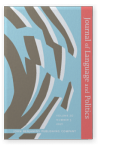Vol. 20:3 (2021) ► pp.451–473
Portrayal of power in manifestos
Investigating authority legitimation strategies of Pakistan’s political parties
Power, conforming to particular political groups of the society, is exercised on the masses by making them believe in the legitimacy of that dominance. This association enables the groups to exercise their power and promulgate their ideologies through their discourse as well. One illustration of this discourse appears in the form of political manifestos. Utilizing the tool of language, the political actors (as agents of political parties) set agendas, pertinent topics and position their stance in these manifestos. Framed under critical discourse analysis, the current study attempts to investigate this act of ‘legitimation’ promulgated by Chilton (2004) and the strategies of Authority Legitimation, devised by Van Leeuwen (2008). The article illustrates how the power-holders utilize their linguistic resources to authorize their stance, idea, and action. The study helps explicating the relation between power, ideology and language and promulgates consciousness regarding the reality constructed by humans, as social and political actors.
Article outline
- 1.Introduction
- 1.1Pakistani political field
- 1.2Politics and persuasion
- 1.3Manifestos as political discourse
- 1.4Legitimation in political discourse
- 2.Data and methods
- 3.Findings and discussion
- 3.1Personal authority in the Pakistani manifestos
- 3.2Expert authority in Pakistani manifestos
- 3.3Role model authority in Pakistani manifestos
- 3.4Impersonal authority in Pakistani manifestos
- 3.5Authority of tradition in Pakistani manifestos
- 3.6Authority of conformity in Pakistani manifestos
- 3.7Statistical calculations
- 4.Conclusion
- Acknowledgements
-
References
